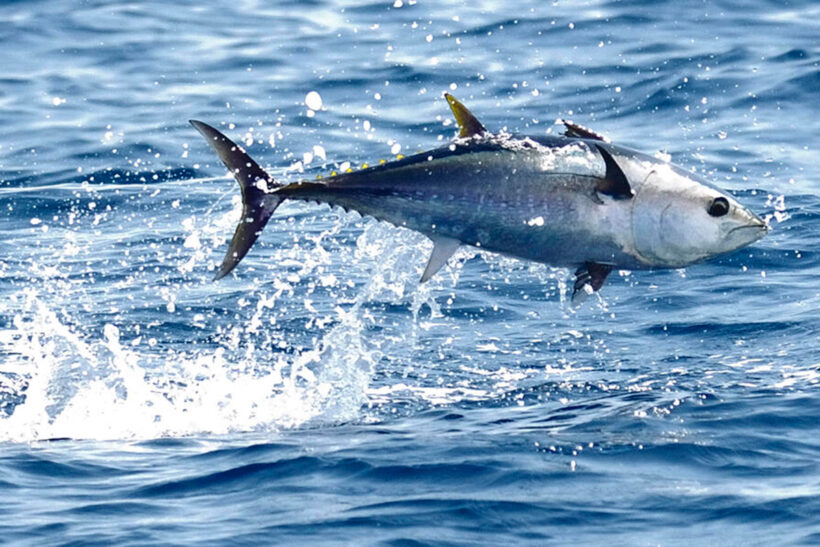Last year the UK opened an exciting new fishery for rod and line bluefin tuna. The fishery got off to a good start, with 10 licence holders gaining practical experience in how best to catch and land bluefin, building on training and research they had done ashore ahead of the opening.
However, the expansion of the bluefin tuna licensing scheme, from 10 vessels issued last year, to 13 this year, has caused controversy, following the confirmation of the 13 successful applicants last week.
Half of the licensees in last year’s fishery have not had their licences renewed, despite investments of both time and many tens of thousands of pounds in purchasing the gear required, and modifying vessels to suit the demands of the fishery, where quality is paramount.
Applicants who did not have their licences renewed include two Devon fishermen who featured in FN after making a trip to the US tuna fishery – part of a Brixham delegation that invested considerable time and money in preparing for the 2024 bluefin season, across the entire value chain.
The US trip followed confirmation that the best market for UK-landed bluefin is in fact the domestic high-end restaurant chain, following a surge in supply of bluefin worldwide, as stocks continue to prosper. The UK’s minute quota of 66t – agreed at Brexit, and just 0.25% of the total EU allocation – means that only 39t is available to licensed vessels this year. Competing with established commercial interests in the EU and Turkey in the Japanese market will therefore always be a challenge.
The MMO said in a letter to all applicants that licences had been issued to vessels scoring highest in an evaluation that looked at ‘eligibility, consideration of history of compliance relating to fishing, and responses to how applicants are best placed to deliver an environmentally sustainable fishery with substantial economic and social benefits’.
“Applications were ranked based on their score, and licence authorisations awarded to the 13 highest-scoring applicants,” the MMO said. “Equal-scoring applicants were selected randomly to fulfil the available licence authorisations.”
In total, 104 licence applications were received. Due to the high number, the MMO said it was unable to provide detailed feedback on a case-by-case basis.
Applicants who failed to make the cut, but have relevant certification to allow them to take out parties of charter anglers, are still eligible to apply for catch and release licences. Applications are open until 30 June for this year’s recreational bluefin catch and release fishery, which will open in August.
FN spoke to several fishermen who did not have their licences renewed. One Brixham-based fisherman said: “It was always understood that the licence could be taken away, but the way it has been done feels wrong for so many reasons.
“Some successful applicants have very small boats – unsafe, in my experience, for fish of this size and power, and not able to carry the ice needed to chill the fish down quickly.
“The refusal of the MMO to even explain why we didn’t qualify is also hurtful. It is all well and good for those applicants who lost nothing, but it is callous to strip me of my livelihood and without any explanation, after I have invested a year of my life and over £100,000 into this fishery.”
The fisherman in question bought a larger boat (32ft), equipping it with an ice room for 400 litres of ice, and cut a hatch in the transom for safe and easy boarding of fish. Each rod costs £1,500, and reels cost £1,300 (they have seven), each of which requires a mile of braid line at around £400 and terminal tackle at around £300.
As one fisherman put it: “The learning curve involved, and the cost of the gear, means that the new fishers won’t even make money this year – all we did last year was work to recoup the investment we made. And even if they do invest, there is no guarantee that this won’t be wasted next year when they also lose their licence.”
One buyer told FN: “Last season saw prices fluctuate between £6 and £17 a kilogram, dependent on quality, which is why we have pushed catchers to invest. We need to avoid the lower prices, which are a consequence of lack of buyer confidence – a situation likely to continue into this season with so many new entrants joining the fishery without the requisite skills or experience.”
This story was taken from the latest issue of Fishing News. For more up-to-date and in-depth reports on the UK and Irish commercial fishing sector, subscribe to Fishing News here or buy the latest single issue for just £3.30 here.
Sign up to Fishing News’ FREE e-newsletter here.






